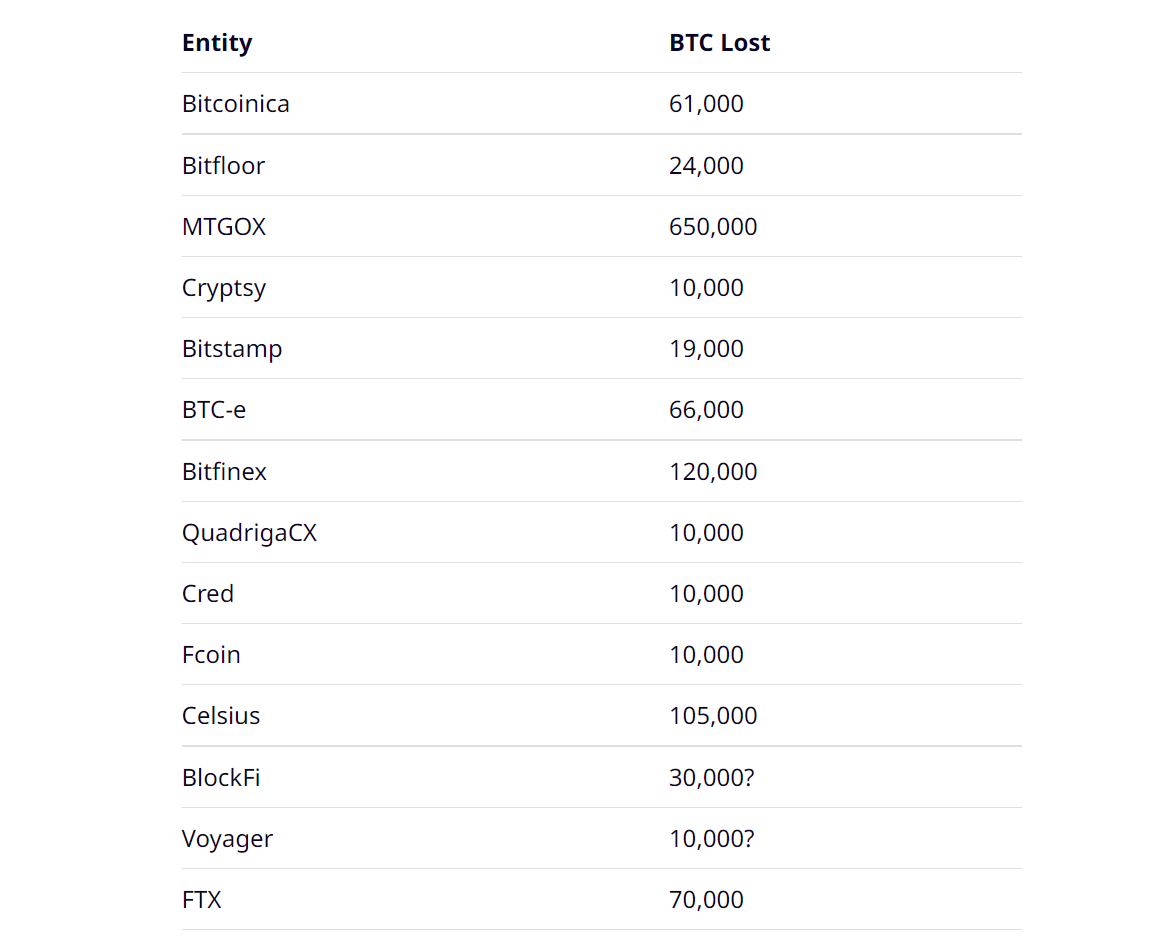Crypto Exchanges crash affects Bitcoin circulation
According to historical data on crypto crashes, at least 14 crypto exchanges have been responsible for the loss of 1,195,000 BTC. This accounts for 6.3% of the 19.2 million Bitcoin currently in circulation. The data also shows that these exchanges have collectively lost $8.2 billion over the past seven years. The largest loss occurred in 2014, when Mt.Gox lost 650,000 BTC, worth $473 million at the time.
Other significant losses include Bitfinex (120,000 BTC), FTX (70,000) Bitcoinica (61,000 BTC), and Celsius (105,000 BTC). Despite these losses, the overall trend appears to be positive, with the number of exchanges losing Bitcoin decreasing each year. This may be due to the exchange taking more regulatory and security measures in response to previous hacks.

Bitcoin is often lauded for its deflationary nature, with a hard limit of 21 million on its total circulating supply. This is in contrast to fiat currencies, which can be subject to inflationary pressures. However, the sad reality is that a significant portion of Bitcoin’s supply is permanently lost due to the demise of cryptocurrency exchanges.
Over the last decade, many exchanges have been hacked, with user funds being stolen or lost. In addition, many exchanges have simply shut down, taking their user’s BTC with them. As a result, it is estimated that at least 5.7% (1.2 million BTC) of Bitcoin is permanently removed from circulation. While this may not seem like much, it represents a significant portion of Bitcoin’s total supply and highlights the need for better security and safeguards for cryptocurrency exchanges.
The need for transparent proof of reserves for Cryptocurrency Exchanges
As the crypto market has grown in recent years, the number of exchanges where digital currencies can be bought and sold has also increased. However, many of these exchanges have been plagued by allegations of fraud, with some failing spectacularly. The most recent example is FTX, whose CEO was accused of misusing customer funds in violation of its terms of service, and eventually filed for bankruptcy protection. This has led to calls for greater transparency around proof of reserves.
This lack of clarity around an exchange’s proof of reserves has often been cited as a primary reason for their sudden collapses. Historical data around crypto crashes revealed that 14 crypto exchanges, together, were responsible for the loss of 1,195,000 BTC, which represents 6.3% of the 19.2 Bitcoin currently in circulation. As the market continues to grow, exchanges must be more transparent about their activities to boost user confidence and prevent another massive exodus of capital.
Mt. Gox: Is Bitcoin Still #1 When It Comes to Exchanges Losing BTC Holdings
Jameson Lopp, co-founder and chief technology officer of Bitcoin storage platform CasaHODL, conducted an investigation that revealed Mt. Gox maintains the top position when it comes to exchanges losing BTC holdings. While Bitcoin’s scarcity is directly related to its value as an asset, Lopp pointed out that fake Bitcoin offerings currently threaten the ecosystem.
He added that “Bitcoin will not be a great store of value if most people are buying fake bitcoin.” Investigations confirmed that at least 80 crypto assets have “Bitcoin” in their names, aimed purely to mislead BTC investors. As a result, investors purchasing fake Bitcoin assets negatively impact the price appreciation of the original Bitcoin.
80+ crypto assets have the word "bitcoin" in their name.
14 have a market cap over $1,000,000.
3 claim to be Bitcoin.
1 is Bitcoin.— Jameson Lopp (@lopp) September 22, 2022
Despite this, Lopp remains confident in BTC’s future, noting that “I still believe Bitcoin is the best bet we have at creating a decentralized form of sound money that can empower individuals all over the world.” In order to ensure Bitcoin’s position as sound money, self-custody comes out as the most effective way to reduce reliance on crypto exchanges and corporate “paper Bitcoin” contracts.
Despite the recent meltdown, El Salvador remains confident in Bitcoin
Salvadoran President Nayib Bukele announced plans to acquire 1 BTC every day starting from Nov. 17, 2022.
We are buying one #Bitcoin every day starting tomorrow.
— Nayib Bukele (@nayibbukele) November 17, 2022
Public records show that El Salvador currently holds 2,381 BTC at an average buying price of $43,357. However, stagnant Bitcoin performance opened up a window of opportunity for the country to substantially bring down its average price of Bitcoin acquisition. By holding Bitcoin in self-custody, El Salvador reduces its reliance on centralized entities and third-party intermediaries. Through this act, Bukele sends a strong message in support of decentralized finance and proves that governments can have a role in advancing the cryptocurrency industry.